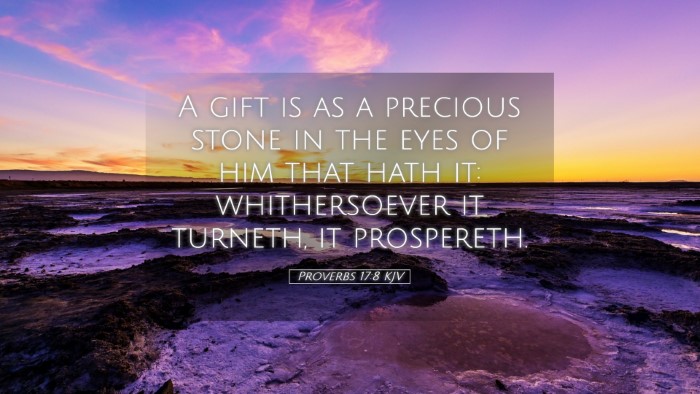Proverbs 17:8 - Commentary
Verse: "A gift is as a precious stone in the eyes of him that hath it: whithersoever it turneth, it prospereth."
Overview of the Verse
This verse emphasizes the value of a gift, likening it to a precious stone. Such a gift is not merely a physical object but embodies significance, especially in the context of relationships and favor. The understanding of this proverb allows deeper insight into the principles of generosity, favor, and the implications of giving.
Insights from Matthew Henry
Matthew Henry notes that the verse illustrates the nature of a gift and its perceived value. He emphasizes that a gift can open doors and create opportunities, much like a precious stone glimmers and attracts attention. Henry elaborates on the idea that gifts can enrich relationships. He observes:
- “A well-received gift can establish favor and goodwill.”
- “Just as a jewel attracts and shines, so does a thoughtful gift attract the favor of others.”
Furthermore, Henry reminds readers that gifts should be given selflessly and not with the expectation of manipulation or coercion. True generosity reflects an understanding of shared human experiences and the joy of giving.
Insights from Albert Barnes
Albert Barnes provides a detailed analysis of Proverbs 17:8, contextualizing the verse within the culture of ancient Israel, where gifts were often seen as a means to secure favor and establish relationships. Barnes states:
- “Gifts have the power to diffuse goodwill and congeniality, leading to prosperity in interpersonal relationships.”
- “The term 'precious stone' connotes rarity and worth, thus magnifying the impact of a well-considered gift.”
Barnes also points to the inherent reciprocity in relationships influenced by gifts, noting that they foster peace and goodwill, thereby enhancing both personal and communal prosperity. Additionally, the verse underscores the idea that the manner and intention behind the gift significantly influence its reception and the resultant outcomes.
Insights from Adam Clarke
Adam Clarke’s commentary delves into the philosophical aspect of gifts, reflecting on their duality – the intention behind the giving and the reception by the recipient. Clarke suggests:
- “Gifts can be a bridge, helping to mend fences and promote reconciliation.”
- “The prosperity associated with gifts emanates not just from the gift itself, but from the goodwill it nurtures.”
Moreover, Clarke asserts that the responsibility lies not only with the giver but also with the receiver. The: manner of reception can significantly influence the gift's eventual outcome, reinforcing the notion that gifts can arise from genuine compassion and mutual respect. He further advises caution in giving, ensuring that the recipient possesses the capacity to value and appreciate the gift appropriately.
Theological Implications
The verse prompts theological reflection on God’s gifts to humanity. The ultimate gift of grace through Christ is, in essence, the most precious stone, representing unmerited favor. Just as a precious stone delights its owner, so does God’s grace enrich the believer’s life. This elevates the conversation around gifts to spiritual dimensions, challenging believers to appreciate and reciprocate God’s generous gifts by extending grace and kindness to others.
Application for Pastors and Theologians
For pastors and theologians, Proverbs 17:8 serves as a valuable teaching point regarding the nature of generosity. They are encouraged to cultivate an environment in their ministries where gifts, be they tangible or intangible, foster goodwill and community spirit. Pastors can utilize this scripture to encourage their congregations to embrace the values of selflessness, empathy, and generosity, thus creating an edifying atmosphere conducive to spiritual prosperity.
Conclusion
In conclusion, Proverbs 17:8 reaches beyond the mere transactional essence of gifts towards the relational and spiritual aspects of giving. By examining this verse through the lenses of Matthew Henry, Albert Barnes, and Adam Clarke, a comprehensive understanding emerges that serves theologians, scholars, and spiritual leaders in their pursuit of deeper biblical truths. The passage fundamentally reveals how gifts, when given and received with the right heart, become powerful instruments of blessing, connection, and collective prosperity.


